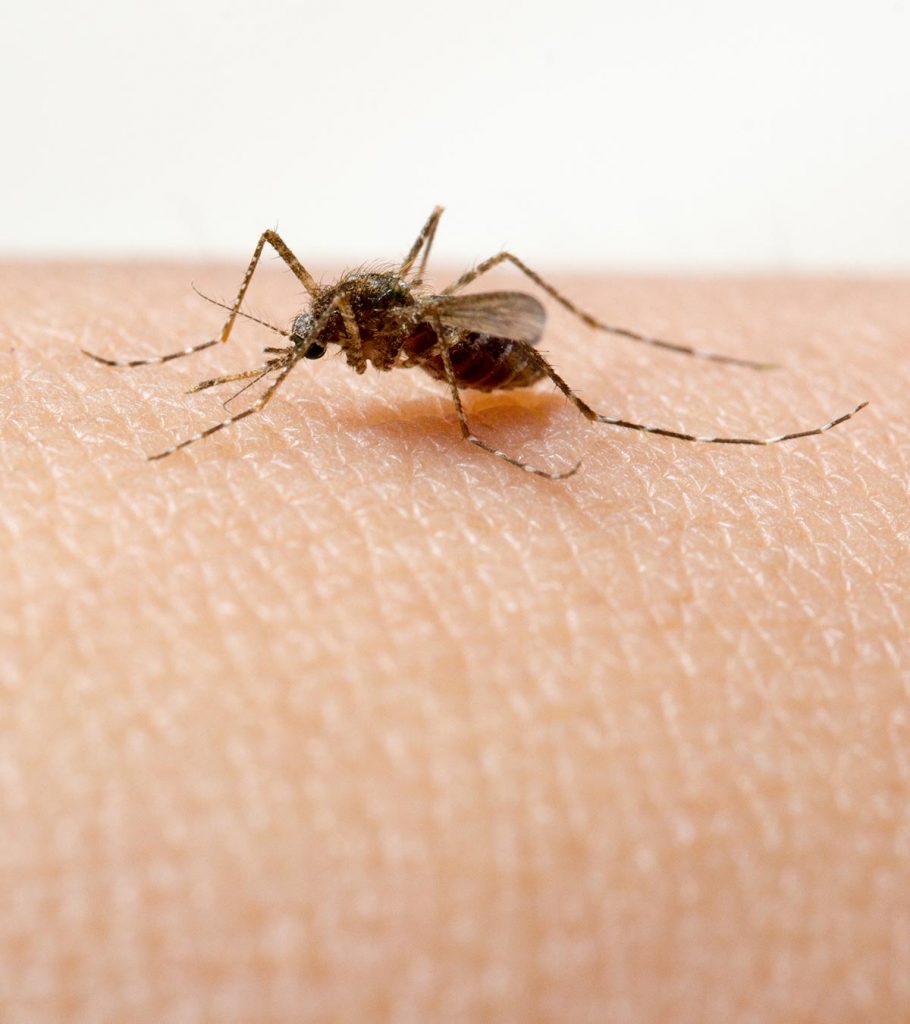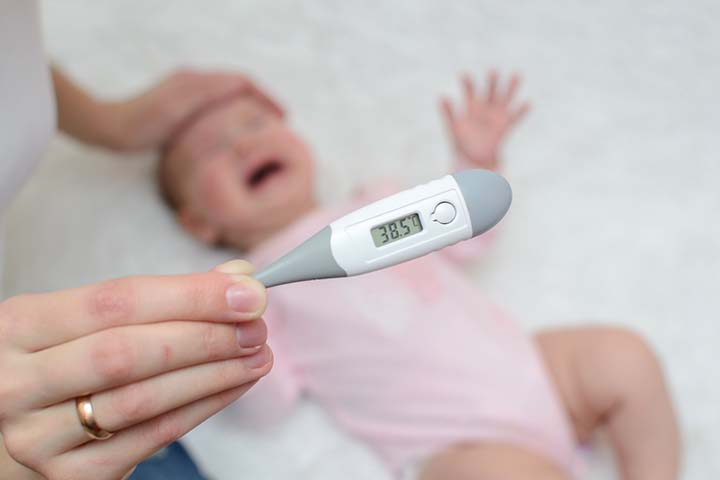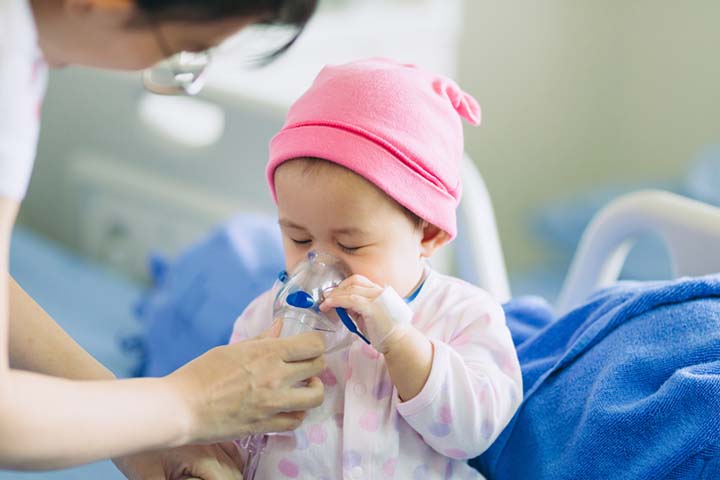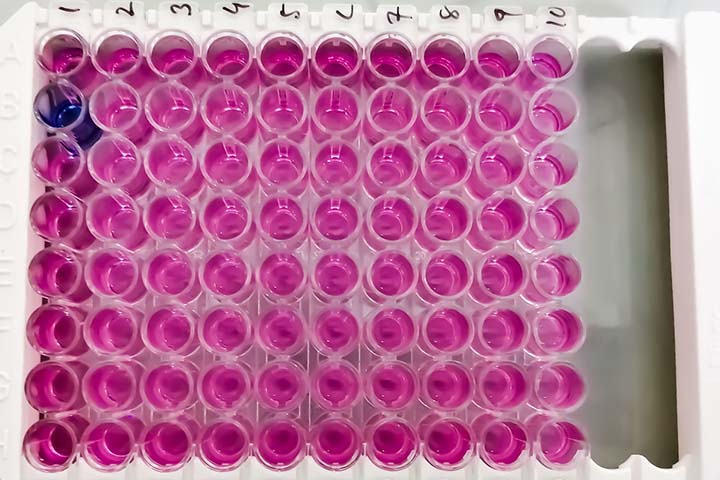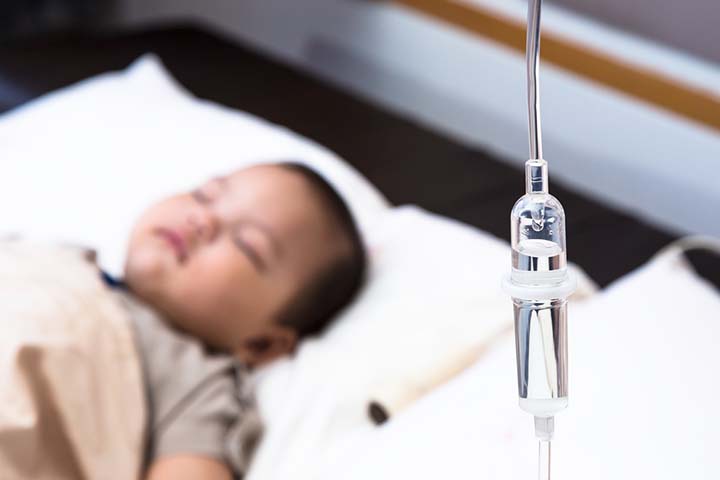Dengue fever in babies and toddlers is a viral infection caused by four types of dengue virus. The illness is usually found in tropical and subtropical countries. It can be severe in babies and toddlers if they are born to mothers having dengue (1). You should be observant of the dengue symptoms in children because they can be easily confused with other illnesses. Although it can be cured at home, proper diagnosis by a healthcare professional is crucial for the prevention of further potential complications. Also, you should take steps to stop the spread of the infection. Read the post to understand more about dengue fever in babies, its symptoms, treatment, and ways to keep children safe from mosquito-borne diseases.
What Causes Dengue And How Does It Spread?
The dengue virus is mainly transmitted by the Aedes aegypti species of female mosquitoes. These species of mosquitoes are also responsible for Zika virus infection,iXAn mosquito-borne infection that causes fever, headache, rash, conjunctivitis, and muscle and joint pain., chikungunyaiXA mosquito-borne disease that causes fever, joint pain, rashes, and headache., and yellow feveriXAn acute viral hemorrhagic disease that causes fever, muscle pain, headache, jaundice, nausea, vomiting, and fatigue.. Dengue infection can be caused by four serotypes of dengue virus, including DENV-1, DENV-2, DENV-3, and DENV-4.
It is transmitted to humans through an infected female mosquito bite, which feeds only during the daytime. After biting an infected person, female mosquitoes can transmit the dengue virus within eight to 12 days to other humans. It is not a contagious disease that spreads from human to human. There are rare cases of vertical transmission (pregnant mother to baby) (2).
Though there is a case of transmitting dengue virus from breast milk, it is recommended to breastfeed babies due to benefits (3).
After an infected mosquito bite, it may take five to seven days for dengue to develop, and the disease follows three phases (4):
- Febrile phase: Fever may last for two to seven days
- Critical phase: It usually begins after the fever and lasts for 24 to 48 hours.
- Convalescent phase: It is the recovery phase, where health status improves. There is a chance of developing an itchy rash during this phase.
Signs And Symptoms Of Dengue In Infants And Toddlers
Symptoms of dengue in kids can be difficult to recognize since they can be similar to those of other common childhood infections. Your child may require immediate hospital admission if any of the following signs and symptoms develop (2) (5)(6).
- High temperature (higher than 38°C or 100.4°F) or low temperature (less than 36°C or 96.8°F)
- Refusing to take oral fluids
- Vomiting (at least three times in 24 hours)
- Vomit has ground coffee appearance
- Sleepiness or restlessness/irritability
- Headache
- Bleeding from the nose or gums
- Vomit or stool has fresh or old blood
- Dark or black coal tar-like stool
- Abdominal pain
- Joint pain
- Skin mottling (livedo reticularis — marble-like appearance of skin with patchy or irregular colors, red or purple marks, spots or streaks on the skin)
- Cold sweating skin
- Cold hands and feet
- Absence of urine for six hours
The above mentioned are the warning signs of dengue that require emergency medical attention as they may be indicating the following.
- Severe dengue: It is a serious form of dengue, causing shock and internal bleeding. Organ impairment and respiratory distress are seen in severe dengue (5).
- Dengue shock syndrome: During the critical period, there is a chance for the development of dengue shock syndrome due to the leak of plasma (fluid in the blood) to the abdomen, lung spaces, etc. It may cause respiratory issues. If shock is undetected or left untreated, it can result in severe complications (7).
- Dengue hemorrhagic fever: It is a complicated form of the disease, which causes bleeding from the nose, gum, and skin hemorrhages and hematuria (blood in urine) (7).
Complications Of Dengue Fever In Infants And Toddlers
In addition to the above mentioned conditions, dengue fever in babies and toddlers may result in (8):
- Febrile seizureiXA convulsion in children while having a fever.(6)
- Liver damages
- Cardiomyopathy (heart disorders)
- PneumoniaiXAn infection of the lungs caused by bacteria, fungi, and viruses.
- Encephalopathy (brain disorders)
- Encephalitis (inflammation of the brain)
When To See A Doctor?
It is recommended to seek immediate medical care if you notice the following signs of severe dehydration (9)).
- Weakness
- Sunken eyes
- Sleepiness
- Cold hands and feet
- Dry mouth, tongue, or lips
- Sunken soft spot on the head
- Reduced urination
- No tears while crying
Diagnosis Of Dengue In Babies And Toddlers
It is recommended to test dengue in babies who live in or recently traveled to dengue-endemic areas. The tests include the following (10).
- Complete blood count
- Molecular test to detect dengue virus in the first one to seven days of illness
- NAAT or NS1 antigen test (in the acute stage), ELISA methodiXAn immunological test that is used to determine the presence of antibodies, antigens, proteins, and hormones. is more accurate than card test
- IgM antibody test (MAC-ELISA) (it can be positive for three months or longer after infection)
- Platelet count and hematocrit values
- Coagulation profile
- Liver enzymes
A platelet count below 100,000 per microliter can be seen in dengue fever, but common in dengue hemorrhagic fever. After three to eight days of illness, thrombocytopenia (reduced platelets) can be observed. About 20% or more increase in hematocrit value (percentage of red blood cells) suggests that there is plasma leakage (11).
Is There Any Treatment For Dengue?
There is no specific treatment for dengue. Like most viral illnesses, dengue too is usually managed with supportive care through fluids. Antibiotics are not used to treat dengue as it is a viral infection, unless there are signs of secondary bacterial infection.
The following essential steps are taken for effective management and treatment of dengue (12)(9).
- One of the main aims of treatment is to bring the high temperature down to below 39°C. High fever may lead to fits, also called febrile convulsions in young children.
- Sponge the child with a cloth soaked in water and give acetaminophen (paracetamol) to control fever. Consult a pediatrician before giving any medicine to the baby.
- Aspirin and NSAIDs (non steroidal inflammatory drugs such as ibuprofen) should not be given since it may worsen platelet problems leading to bleeding (6).
- Oral or intravenous route fluid administration is the mainstay treatment. Intravenous fluids are administered in the cases of hospitalization.
- You may increase the oral fluid intake if your baby is able to drink. Intravenous fluid administration is required if there is an inability to maintain oral intake and/ or the baby is in shock.
- It is advised to observe your baby during the critical period for warning signs.
Your baby may require blood products in the case of bleeding from nose, gums, or gut. It may take a while to have a normal platelet count after the illness.
Is It Possible To Treat Dengue Fever At Home?
Mild cases can be treated with ample rest and the consumption of abundant fluids (17). If there are no warning signs and the baby can take oral fluids, then home treatment might help. However, it is recommended to visit a pediatrician for proper guidance and to identify the illness. Hospitalization is mandatory if your child has severe fever and complications of dengue. Home treatment steps include (1).
- Medication to control fever: Acetaminophen is given for fever.
- Hydration: Adequate fluid and electrolyte intake to cope with the loss of fluid from the body during fever or vomiting.
Can Dengue Fever Be Prevented?
According to the CDC Advisory Committee on Immunization Practices (ACIP) statistics, over 94% of reported dengue cases between 2010 and 2022 were linked to travel in regions where the disease was prevalent. Therefore, if you are living or traveling to a country with a risk of dengue, then you should take precautions to keep your baby away from mosquito bites. You may use mosquito repellents for babies older than two months. If your child is younger than two months, then use mosquito nets (1). The following methods can keep mosquitoes away from your baby (13).
- Have mosquito net to the crib, stroller, infant carrier, doors, and windows
- Use loose clothing to cover arms and legs
- Avoid stagnant water around the house
- Keep wet dustbins covered
- Keep windows and doors closed in dusk and dawn
Dengue fever in babies and toddlers is a mosquito-borne disease that isn’t vaccine-preventable. However, one can prevent their babies and toddlers from infection with simple measures, such as using mosquito nets, keeping doors and windows closed during dawn and night, and avoiding water stagnation around the house. Using baby-safe mosquito repellents for babies older than two months is another effective way to prevent dengue fever. If a baby is once infected, reinfection can occur by another dengue virus, so you have to be careful.
Key Pointers
- Infected female mosquitoes transmit dengue, a viral infection.
- Symptoms appear 5-7 days after infection and include fever, vomiting, sleepiness, irritability, bleeding, and dark stools in children.
- Severe dengue can cause abdominal pain, skin mottling, cold extremities, cold sweat, feeding refusal, lack of urination for six hours or more, and severe dehydration.
- Dengue can be prevented and treated with measures such as timely diagnosis, temperature reduction, medications, intravenous fluids, oral fluids, and electrolytes.
- Infants with dengue may experience severe complications such as febrile seizures, pneumonia, and liver, heart, and brain disorders.
Dengue fever is caused by a virus spread by mosquitoes. Learn more about the causes of dengue and the preventive measures that can be taken in this informative video!
